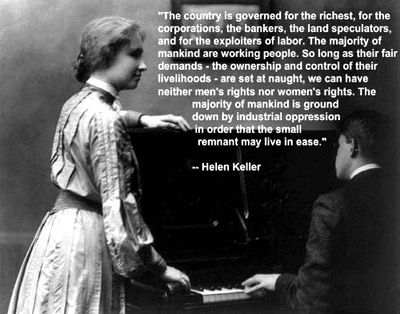In a previous blog, I demonstrated that the correct model to use as the basis for capitalism and free markets, is not evolution but instead it is ecological. The implications of this are critically important. An ecological model predicts what we actually see in the marketplace when capitalism and free market operate. Corporations get larger and larger, sequestering resources away from smaller corporations which then die from the competitive pressure. Labour is an expendable resource. Thus “the survival of the fittest” competition results in big corporate gorillas dominating the marketplace.

In society, if this is the desired result, there is no need to impose any controls other than enforcing the rules for the right to life, liberty, and property. On the other hand if that is not the desired result then some modifications to the rules or imposition of new rules will be necessary to reshape the variables and hence the results of competition.
It is also important to understand that the only people in the equation are entrepreneurs. Employees, workers, unemployed, subsistence level people, etc. are either not included or become resources to be used for the purposes of the corporation as long as they cannot be replaced by a more efficient machine. Here is Helen Keller’s notion of the situation.
And yet the observed real world continues to have and need people other than entrepreneurs. The model used to describe capitalism today is incorrectly based on evolution and falsely predicts a diverse and efficient marketplace with ample places for various levels of skilled labour and management. A more accurate model of capitalism based on ecological principles more accurately predicts enormous corporations emphasizing the highest profit margins by reducing labour costs either by using machines or exporting the labour related tasks offshore, paying the lowest prices for resources, and reducing the quality of end products to attract sales and ultimately concentrate wealth in the few entrepreneurs left in the system. Amazingly neither model considers the vast majority of people.
Was there another fundamental error way back when John Locke pronounced that the only rights were life, health, liberty, and property? These human “rights” are derived from appetites or drives in the living world. Is there a major omission from Locke’s list? Did he forget the drive/right to procreate? If you add that to the list, capitalism now includes all the variables and everybody. This model now predicts a growing population. Capitalism takes advantage of an increasing population in the sense that a corporation can replace older more expensive labour with younger cheaper labour. Much later Milton Friedman observed that in a capitalist system, there is a natural oversupply of labour resulting in a constant level of unemployment.
Locke also noted that if the people delegate some of their rights to a government, the government is expected to protect individual rights. If the government fails to protect individual rights to the level expected, the people will judge that the compact with the people has been broken. At that point, the government is deemed illegal and must be removed, if necessary by force.
All of these factors operate together. Another element arose spontaneously inside capitalism as a reaction to the tendency of corporations to reduce the amount of wealth distributed to the labour force, and instead to concentrate the wealth in ownership of fewer and fewer corporations resulting most of the wealth of the country concentrated in a few people. In dictatorial economies where the wealth was concentrated by force, when pushed hard enough people organized themselves and revolted. In modern capitalism, workers organized themselves and formed unions that could strike — a type of non-violent revolt. The strike also attempts to lock away alternate labour sources, thus defeating the availability of cheaper labour. The spontaneous emergence of labour unions created a balancing force to hold labour prices at a higher level. So far the balancing forces have not stabilized, and probably will take some time either to find a balance or develop a new type of economic system spontaneously.
